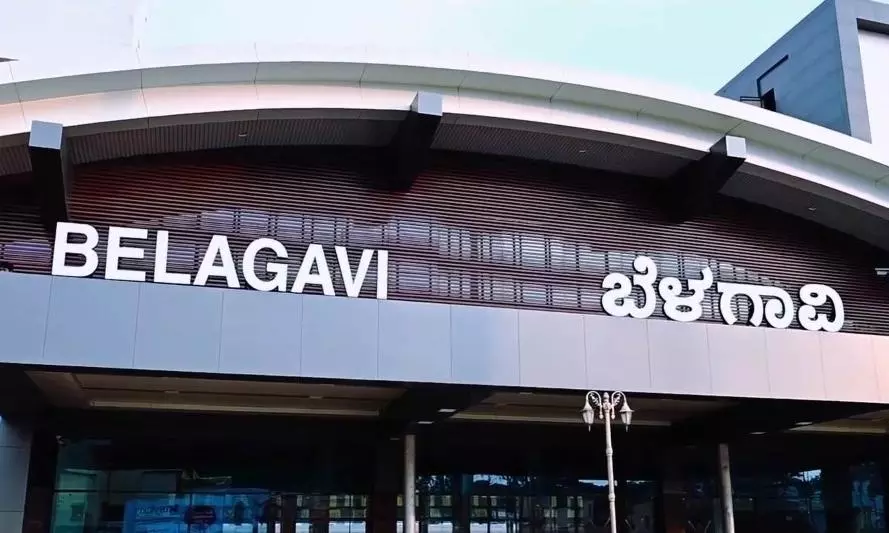
On the eve of the Rajyotsava celebrations, tensions are rising in Belagavi over recent initiatives launched by the Karnataka and Maharashtra governments. File photo shows the Belagavi railway station.
Karnataka turns 50, but its Maharashtra border row refuses to go away
While the state mostly enjoys border peace with Kerala, TN and AP, the Belagavi issue remains contentious

Follower, a Marathi Kannada film directed by debutant Harshad Nalawade, was screened at the Rotterdam International Film Festival earlier this year and picked up rave reviews.
The film encapsulates the long-standing fight between Belagavi (former Belgaum)'s main linguistic groups – Kannada and Marathi – through the lens of Raghu, a radicalised journalist. It takes inspiration from the director's own experiences of growing up in a linguistically marginalised community of the border city of Belagavi.
The film never seems to lose relevance as the 67-year-old linguistic dispute continues to rear its head now and then. This time, on the eve of the Rajyotsava celebrations, tensions are rising in Belagavi over recent initiatives launched by the Karnataka and Maharashtra governments.
What sparked the recent dispute
On November 1, the southern state will celebrate the Golden Jubilee of its naming – from Mysore presidency to Karnataka. The Siddaramaiah-led Congress government has adequate funds for the development of Kannada schools in border areas as part of the celebrations. In fact, in 2010, the Karnataka government had formed the Karnataka Border Area Development Authority to develop the areas and to monitor and evaluate the implementation of projects and programmes.
Meanwhile, on October 15, 2023, the Maharashtra government resolved to extend its health insurance scheme for the poor to the Marathi-speaking population on the Karnataka side of the border.
The Karnataka government objected to the plan to bring the Marathi-speaking population in the 865 villages on the Karnataka side of the border under Maharashtra's Mahatma Jyothi Phule Jan Arogya Yojana, which was launched in April.
It claimed that implementing the scheme of one state in another is against the federal system. Condemning the plan, Kannada organisations in Belagavi wrote to Siddaramaiah, urging him to initiate steps to keep Maharashtra in check.
Ashok Chandargi, president of an action committee of the Kannada organisation in Belagavi, held successive governments responsible for the present development. He also blamed the Karnataka government for not appointing a minister in charge of the border on the lines of what the Maharashtra government has done.
The history
Of course, there have been border disputes since the reorganisation of states in India in 1956. These problems have surfaced mostly because of claims and counterclaims between states. The Union government has made efforts from time to time to resolve the border disputes but essentially it is the concerned state governments that achieve resolution through discussions and some give-and-take.
In recent years, tensions started to mount between Karnataka and Maharashtra after the Maha Vikas Aghadi government headed by Uddhav Thackeray came to power in Maharashtra in 2019. Uddhav asked Maharashtra legal teams in the Supreme Court to stake claim of several areas bordering Karnataka.
This happened when the residents of 40 villages in Jath taluk in Sangli district on the Maharashtra border, mostly inhabited by Kannadigas, wanted their areas to be merged with Karnataka. However, the hearing of that case is moving at a snail’s pace in the apex court.
Meanwhile, the Centre intervened to form a six-member committee of ministers last December to facilitate discussion between the two states.
While Belagavi is located in the north-western part of Karnataka, Kasaragod, in the northernmost part of Kerala, is also facing a similar issue with Karnataka. This may not be as serious as the Belagavi issue but for the past six decades, Kannadigas in the region have been demanding that Kasaragod come under Karnataka.
Karnataka does have its differences with Tamil Nadu and Andhra Pradesh, as it does with Kerala, over the recommendations of the second State Reorganisation Commission constituted in 1956, headed by Justice Fazal Ali. However, they are nowhere near as serious as the dispute with Maharashtra are.
Successive commissions
Maharashtra had long objected to the recommendations of the Justice Fazal Ali commission. It demanded the constitution of a new commission to reconsider the recommendations of the earlier one. After nearly a decade, the Union government constituted one headed by Justice Mehr Chand Mahajan, a former Supreme Court judge.
The Mahajan Commission principally agreed with the proposition that people speaking one language should be grouped together in one area, and arrived at a 'swapping formula'. They decided to exchange some Kannada-speaking areas such as Solapur, Jath and Akkalakot in Maharashtra for some Marathi-speaking areas in Karnataka.
The Commission stated that some 262 villages in Karnataka had more Marathi speakers than Kannada speakers, while 247 villages in Maharashtra had more Kannada speakers than Maharashtra.
The Commission mandated that if Maharashtra got 262 villages and towns such as Nippani, Nandagadh and Khanapur from Karnataka, it should hand over 247 villages and towns, including Solapur, to Karnataka. It did not agree with Maharashtra’s demand to take Belagavi. When the Commission submitted its report in 1967, Karnataka accepted its proposals, but Maharashtra rejected them.
Maharashtra forms separate ministry
After ousting Uddhav and coming to power, the Eknath Shinde government appointed two ministers, Chandrakant Patil and Shambhuraj Desai, to coordinate with a legal team for the border dispute. Last year, some leaders from the Shiva Sena (UB) faction raised the issue of merging Belagavi with Maharashtra, resulting in a law-and-order situation in Kolhapur.
Karnataka hit back saying the Kannada-speaking areas of Jath and Akkalakot in Maharashtra should be merged with Karnataka. The state also has a Karnataka Border Development Authority which seems ineffective.
With claims and counter claims between Karnataka and Maharashtra, Belagavi still remains a contentious issue for both the neighbouring states, even after 67 years. And, there are times in these year, when a clash between MES and Kannadigas turn ugly now and then.
Next Story

